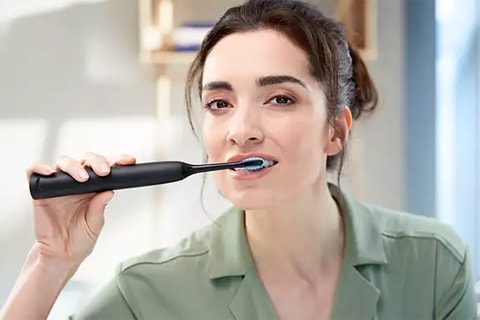Plaque on teeth: How to remove plaque from teeth at home
6 minutes
Learning how to remove plaque from teeth is essential for preventing tooth decay and gum disease. In this article, you will learn why it is important to prevent plaque formation, discover the best ways to remove plaque from teeth naturally and other dental practices to keep your teeth healthy.
Understanding dental Plaque
Dental plaque is the sticky film that accumulates on the teeth. This layer forms when bacteria in the mouth mingle with sugars and starches from the diet, forming a layer that clings to the teeth and gumline. If left unaddressed, dental plaque can be detrimental to one’s oral health, leading to tooth decay1 and gum diseases.2
Understanding plaque and knowing how to prevent plaque on teeth is a vital step towards maintaining overall oral health. Once we know what plaque is and why it's important to prevent it from accumulating, learning how to remove plaque becomes much easier.
The effects of plaque on teeth
When dental plaque accumulates, it can set the stage for tooth decay and gum disease.1,2 Plaque that is not removed daily, can mix with the minerals in saliva and harden on the tooth surface forming tartar. Tartar buildup, or dental calculus, forms a hard shell on the teeth within 24 to 72 hours and can lead to gum disease and infections if not removed professionally.2
How to remove plaque from teeth at home
If your aim is to enhance your oral hygiene regime at home, there are a few different ways you can do this. We will delve into practical methods of brushing, flossing, and rinsing, which are crucial in combating dental plaque.
- Choose the right toothbrush
Having the right devices is one of the best ways to remove plaque. Take the Philips Sonicare Prestige 9900 Power Toothbrush with SenseIQ. Its sonic brushing and 62,000 bristle movements clean hard-to-reach areas effectively and gently. Complete with the A3 Premium All-in-One brush head and its angled bristles, you can remove up to 20x more plaque*, even in those harder-to-reach areas. Make sure to target all areas of your mouth and let the Philips Sonicare Prestige 9900 do the rest for easy plaque removal at home.
- Flossing methods
Flossing plays a significant, though often overlooked role in removing plaque in areas inaccessible to brushing. It is recommended to floss once a day, using tools like unwaxed floss, floss holders, or water flossers to clean your teeth and mouth.
Unwaxed dental floss can be particularly effective at cleaning the narrow spaces between teeth, while water flossers offer a powerful stream of fluid to flush out food particles and plaque.
- Using antibacterial mouthwash
Rinsing with an antibacterial mouthwash can reduce plaque, that can cause gum disease. Incorporating a fluoride mouthwash into your routine fortifies your teeth’s defenses against decay.3
How to remove plaque from teeth naturally
If you favor natural solutions when it comes to plaque removal at home, multiple remedies have demonstrated the potential to do so. Be sure to consult your dental professional before trying any of these methods, as some natural solutions may not be suitable for all users.
Tips for removing plaque from teeth naturally.
- Baking soda
Baking soda doubles as a plaque-fighting agent when mixed with water to form a paste. Its gentle abrasiveness works to dislodge the sticky film without damaging your tooth enamel, making it a safe and effective tool for daily use.4
- Apple cider vinegar
Apple cider vinegar, known for its versatility, can also serve as a mouthwash to break down plaque.5 Dilute it with water to balance its acidity, and swish it around your mouth for a natural plaque-fighting rinse. However, be wary of its erosive potential; overuse could damage tooth enamel,6 a shield that once breached, cannot be restored.
Keep in mind that while home remedies can be beneficial, they do not replace professional dental care. Always consult with your dental professional before introducing new elements into your oral care routine and be mindful of any allergies that could turn these natural allies into foes.
How to prevent plaque on teeth
Knowing how to how to get rid of plaque on teeth is important, but knowing how to prevent plaque buildup is even better. Armed with the right tools and knowledge, you can maintain a positive oral health routine that helps keep plaque at bay.
- Healthy diet
A healthy diet alongside your oral health can be a powerful ally when it comes to plaque removal at home. Limit sugary and starchy foods, which can feed the bacterial armies that produce plaque, is a positive step towards maintaining a healthy mouth.7
- Regular dental checkups
Regular visits to your dental professional for dental examinations and cleanings are incredibly important to prevent oral health issues caused by plaque accumulation. Professional dental cleanings are essential to remove plaque and/or tartar that may have been missed during daily care, helping to protect your teeth from future oral health issues.
- Consistent oral hygiene routine
A consistent daily routine is vital to keep plaque under control. To prevent tooth decay, practice good oral hygiene by brushing twice a day with fluoride toothpaste and a high-quality electric toothbrush, use dental floss once per day, and rinse daily with an antimicrobial mouthwash.3, 8
Be sure to care for your toothbrush and replace your toothbrush head every three to four months to maintain its effectiveness.
Complications of untreated plaque in teeth
Neglecting dental plaque buildup can lead to serious consequences, including:
- Persistent bad breath9
- Receding gums10
It is important to take care of your dental health and address plaque buildup to prevent these problems, and one effective way is to prevent plaque buildup through regular dental checkups and proper oral hygiene.
Preventing the buildup of plaque requires consistent effort, proper techniques, and occasional professional assistance. Brushing, flossing, using natural remedies – if they’re right for you - and regular dental visits are key practices for a healthy mouth.
Disclaimer
* vs. a manual toothbrush
Sources
1 Loesche WJ. Microbiology of Dental Decay and Periodontal Disease. In: Baron S, editor. Medical Microbiology. 4th edition. Galveston (TX): University of Texas Medical Branch at Galveston; 1996. Chapter 99
2 National Institute of Dental and Craniofacial Research, Periodontal (Gum) Disease
3 Brayer L, Mor H, Anaise J, Gedalia I. Effect of sodium fluoride rinsing on dental plaque accumulation. Refuat Hapeh Vehashinayim. 1977 Oct;26(4):45-7. English, Hebrew. PMID: 273591.
4 Putt MS, Milleman KR, Ghassemi A, Vorwerk LM, Hooper WJ, Soparkar PM, Winston AE, Proskin HM. Enhancement of plaque removal efficacy by tooth brushing with baking soda dentifrices: results of five clinical studies. J Clin Dent. 2008;19(4):111-9. PMID: 19278079.
5 Asaad N, Laflouf M. Effectiveness of Apple Cider Vinegar and Mechanical Removal on Dental Plaque and Gingival Inflammation of Children With Cerebral Palsy. Cureus. 2022 Jul 15;14(7):e26874. doi: 10.7759/cureus.26874. PMID: 35978745; PMCID: PMC9375849.
6 American Dental Association, Natural Teeth Whitening
7 Atkinson FS, Khan JH, Brand-Miller JC, Eberhard J. The Impact of Carbohydrate Quality on Dental Plaque pH: Does the Glycemic Index of Starchy Foods Matter for Dental Health? Nutrients. 2021 Aug 6;13(8):2711. doi: 10.3390/nu13082711. PMID: 34444871; PMCID: PMC8401118.
8 Walsh T, Worthington HV, Glenny A, Marinho VCC, Jeroncic A. Fluoride toothpastes of different concentrations for preventing dental caries. Cochrane Database of Systematic Reviews 2019, Issue 3. Art. No.: CD007868. DOI: 10.1002/14651858.CD007868.pub3
9 Johns Hopkins Medicine, Halitosis (Bad Breath)
10 Mythri S, Arunkumar SM, Hegde S, Rajesh SK, Munaz M, Ashwin D. Etiology and occurrence of gingival recession - An epidemiological study. J Indian Soc Periodontol. 2015 Nov-Dec;19(6):671-5. doi: 10.4103/0972-124X.156881. PMID: 26941519; PMCID: PMC4753713.
What you need
-
Prestige 9900
Rechargeable Toothbrush
HX9990/11
- SenseIQ
- 20x more plaque removal*
- 15x healthier gums**
- Visual pressure sensor
- 5 modes & 3 intensities
-
- Removes 20x more plaque
- Up to 15x healthier gums
- Removes 100% more stains
- Soft
- 2-pack
-
- Quad Stream technology
- Pulse waves guide as you go
-
Power Flosser 3000
Oral Irrigator
HX3711/20
- Quad Stream technology
- 2 flossing modes, 10 intensities
- Whisper quiet design
- Pulse waves as you go














